For the few black women prosecutors, hate and ‘misogynoir’ are part of life
Only 1.84% of top prosecutors are women of color, 1.34% are black women.
Marilyn Mosby is part of the 1% -- an elite group of 45 women of color among the nearly 2,400 elected prosecutors in the United States.
Usually being a part of an exclusive club is loaded with perks and in some cases inspires envy from those who yearn to join the ranks.
But for many of these pioneering women, the process has not only been fraught, but filled with outright danger, with people not only targeting them because they are women, but because they are black as well -- what some call “misogynoir” (a term coined by scholar Moya Bailey and creator Trudy that describes racism and misogyny towards black women).
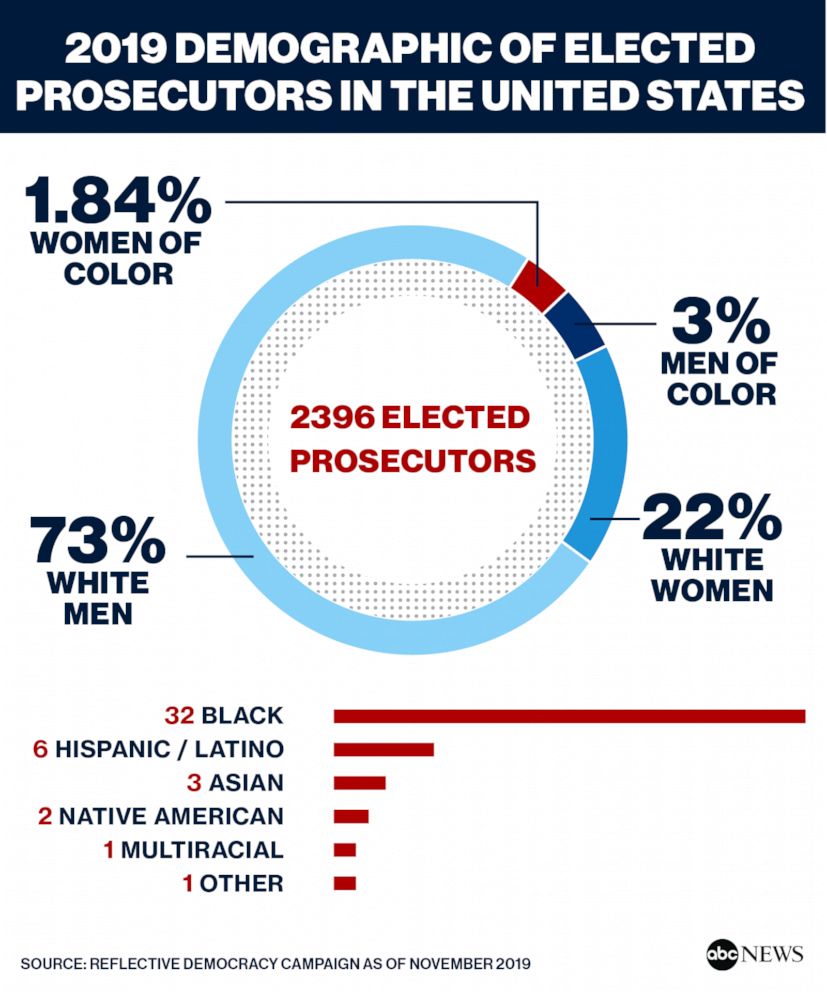
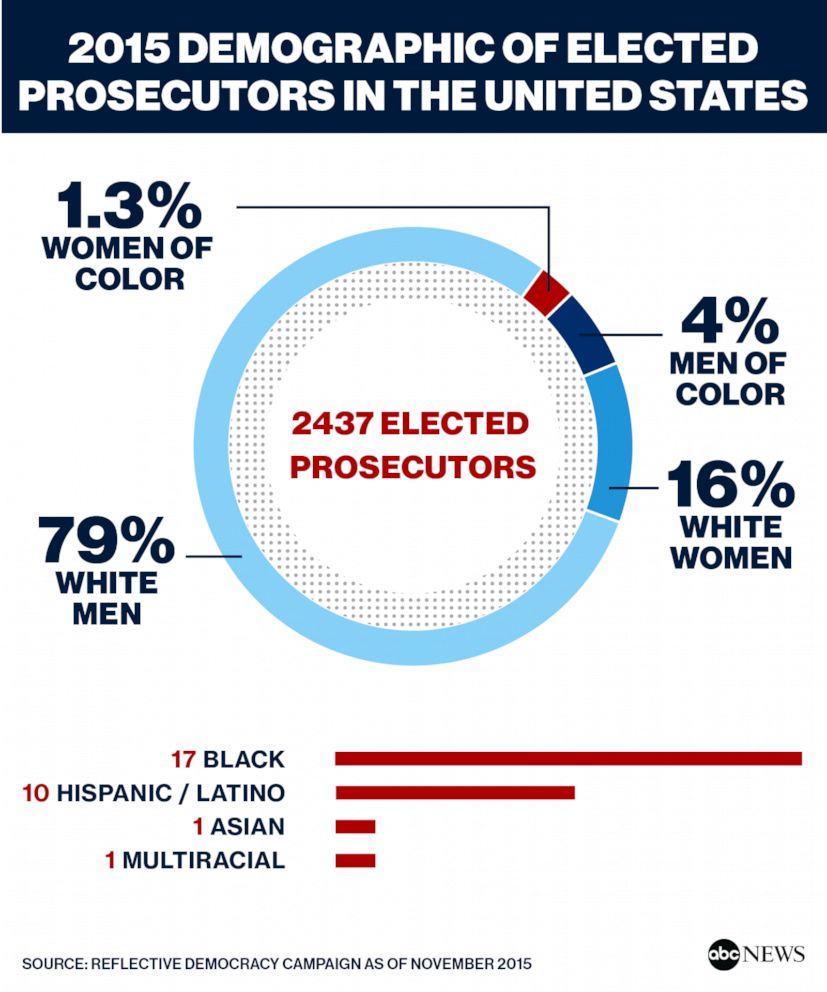
Threats and challenges to their authority have come from a range of sources -- anonymous hecklers, public officials and even crossed racial barriers, according to voicemails, emails and interviews with several of the women.
Being in this club is also exceedingly lonely, the women and experts say, which has added to the anxiety of the daily difficulties they face in doing their jobs. As such, some have banded together in a “Sisters Circle” to support each other.
"I represent 1% of all elected prosecutors in the country," said Baltimore City's State Attorney Marilyn Mosby in an interview with ABC News.
ABC News interviewed a group of these top law enforcement officials to highlight the challenges they face both as women and minorities amid Black and Women's History Months. While many elected officials face threats and unhappy constituents, the challenges to this small group of women are unique, because of race and gender, experts say.
"Prosecutors are the ones who decide who are going to be charged, what they're gonna be charged with, what sentence recommendations they're going to make. They are a key and probably one of the most important and vital stakeholders within the criminal justice system," said Mosby who says she learned early how not to internalize receiving hateful, sexist and racist attacks.
"It's not even about you personally, it's about what you represent. And what you represent to the status quo...The keepers of the status quo, are tones that establish over the criminalization of poor black and brown people, mass incarceration," said Mosby.
Prior to the November 2019 election cycle, 20% of the population are women of color, but represented 1.87% of the 2,396 elected prosecutor titles -- district attorney, prosecuting attorney, county attorney, county prosecuting attorney, state's attorney, solicitor general and attorney, according to the Reflective Democracy Campaign (RDC), a project with the Women Donors Network (WDN), the only organization believed to keep this recent data.
The numbers were lower in 2015, when Mosby was first elected - just 29 women of color, according to RDC (representing 1.3%).
Mosby says she had a mission to reform the criminal justice system in her city and at the age of 35 she beat an incumbent and became the youngest leading prosecutor in the country.
Shortly after Mosby's win, she met her idol who was also someone "who looked like myself," she said, former California attorney general and one-time Democratic presidential hopeful Kamala Harris. Harris was the first black woman to serve as the state's attorney general and the first woman to serve as district attorney for San Francisco, elected in 2003.
"I was so impressed by this woman," said Mosby.
But, Mosby's six-hour meeting with Harris couldn’t prepare her for what was to come after she charged six police officers in connection to the April 2015 death of 25-year-old Freddie Gray.
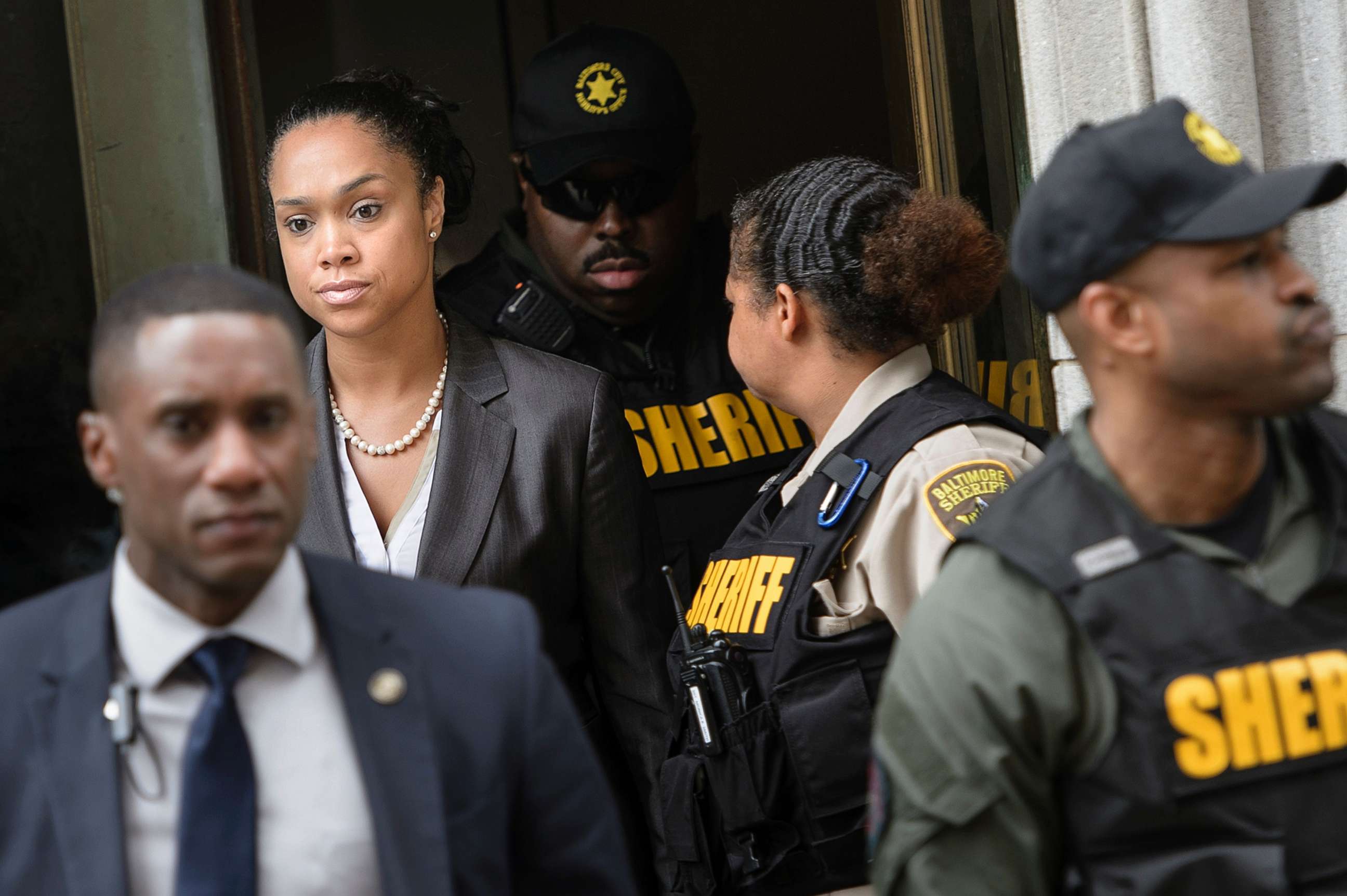
Gray was arrested by the officers for allegedly possessing a knife. A bystander captured the arrest on cellphone video, where Gray was seen dragged by two officers and put into the back of the police van. Gray later died from a spinal cord injury he allegedly suffered while in police custody. After three of the officers were acquitted after trial and one ended with a mistrial, Mosby dismissed the charges against the rest.
"I didn't anticipate the hate mail and the death threats and/or being thrust into the international spotlight," Mosby said.
Two days after Mosby announced criminal charges against the police officers, on May 1, 2015, she received an email with the subject "Obituary of Marilyn Mosby."
The email described Mosby being "gunned down in cold blood walking into the courthouse" and her husband, state delegate Nick J. Mosby was "found tortured and dismembered." The gruesome email ended with, "several family members, related to Mr. and Mrs. Mosby, have been reported 'missing', the police are not currently investigating and feel that none of the missing are significant."
The threats were turned over to investigators and no arrest were made, Mosby said.
Over the next five years, Mosby says she has received hundreds of sexist, racist and threatening messages accompanied with accusations of being anti-police -- a false narrative, said Mosby, who says she comes from a law enforcement family. Her dad was a police officer and her grandfather was one of the first African American police officers in Massachusetts, she told ABC News.
Even after the Gray case ended with no convictions in state court and no federal charges filed against the officers, Mosby says the hateful letters, voicemails, emails and social media posts continued.
"I'm not fazed by the hate and the political rhetoric and the implicit bias and the 'misogynoir' coverage that I have to deal with on a day to day basis, because that doesn't define me. It's -- it's bigger than me," said Mosby. "It's, not about me, it's about what I represent to a system that has been -- and it has disproportionately impacted communities of color for far too long."
Despite the threats, Mosby says she pursued her agenda, creating an alternative to incarceration program -- modeled after Harris' national "Back on Track" program -- for low-level felony drug offenders called AIM to B'More. And after the U.S. Department of Justice found corruption within the Baltimore Police Department's now defunct Gun Trace Task Force in 2016, she requested that almost 800 convictions tied to those officers be thrown out, according to the Baltimore Sun.
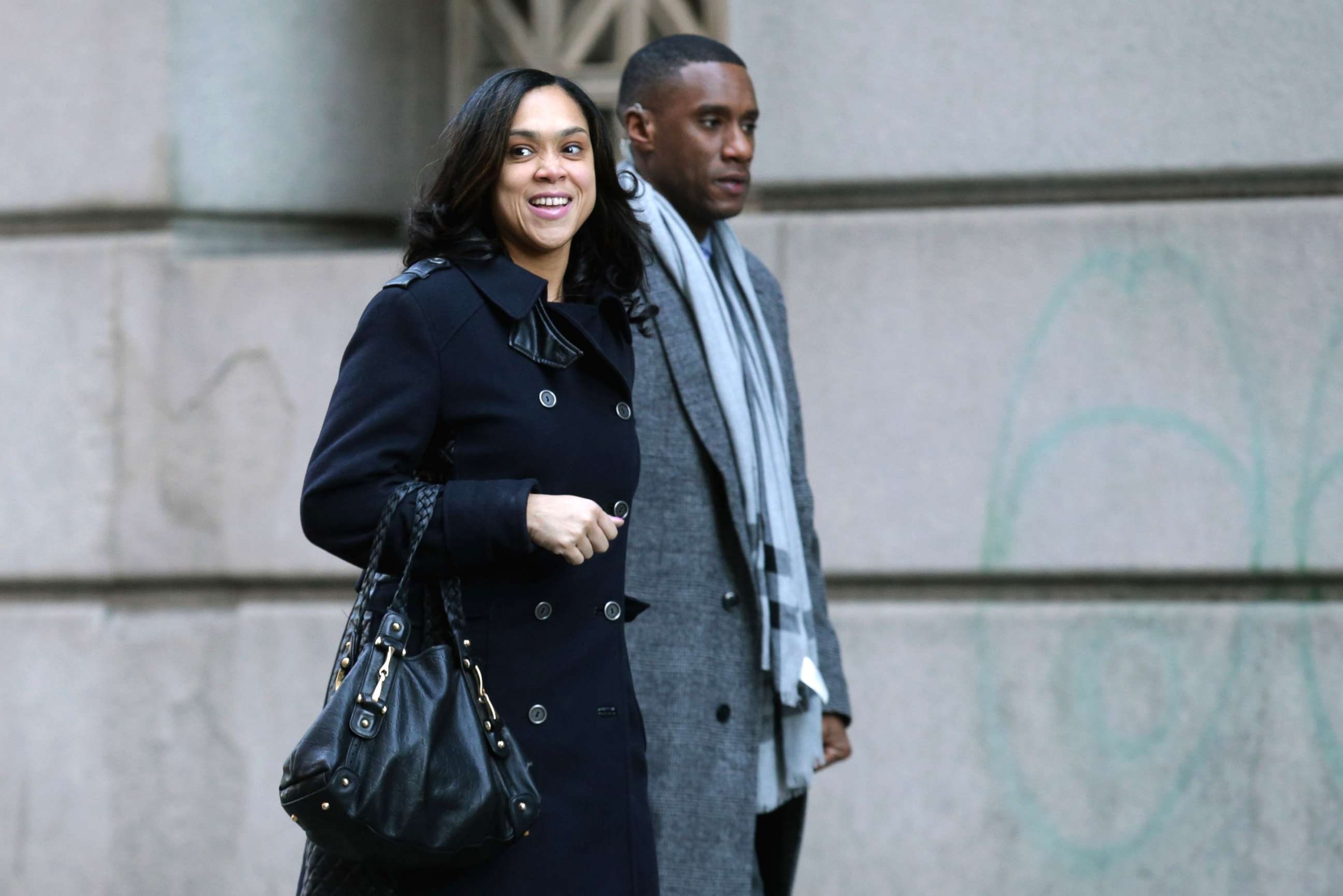
A year after being sworn into office, Mosby noticed a rise in black women running for and winning lead positions in prosecutor offices across the country.
"I...made a promise to myself that I would be supportive of black women in these positions," said Mosby. "And what I was able to do was to create a network of support... understanding and recognizing that, you know, some of the challenges and the obstacles that we go through on a day to day basis are unlike anyone else."
She created what she calls a "Sisters Circle," a support group for women of color leading criminal justice agencies. The group is comprised of Mosby and 11 other black women prosecutors.
'Sisters Circle'
Mosby's promise to support her fellow sisters in justice did not go unnoticed. In January, the "Sisters Circle" traveled to St. Louis, Missouri, to support Circuit Court Attorney Kim Gardner, who was announcing that she had filed a federal civil rights lawsuit against her city, police unions and others for, the suit alleges, launching a racist campaign to push her out of office.
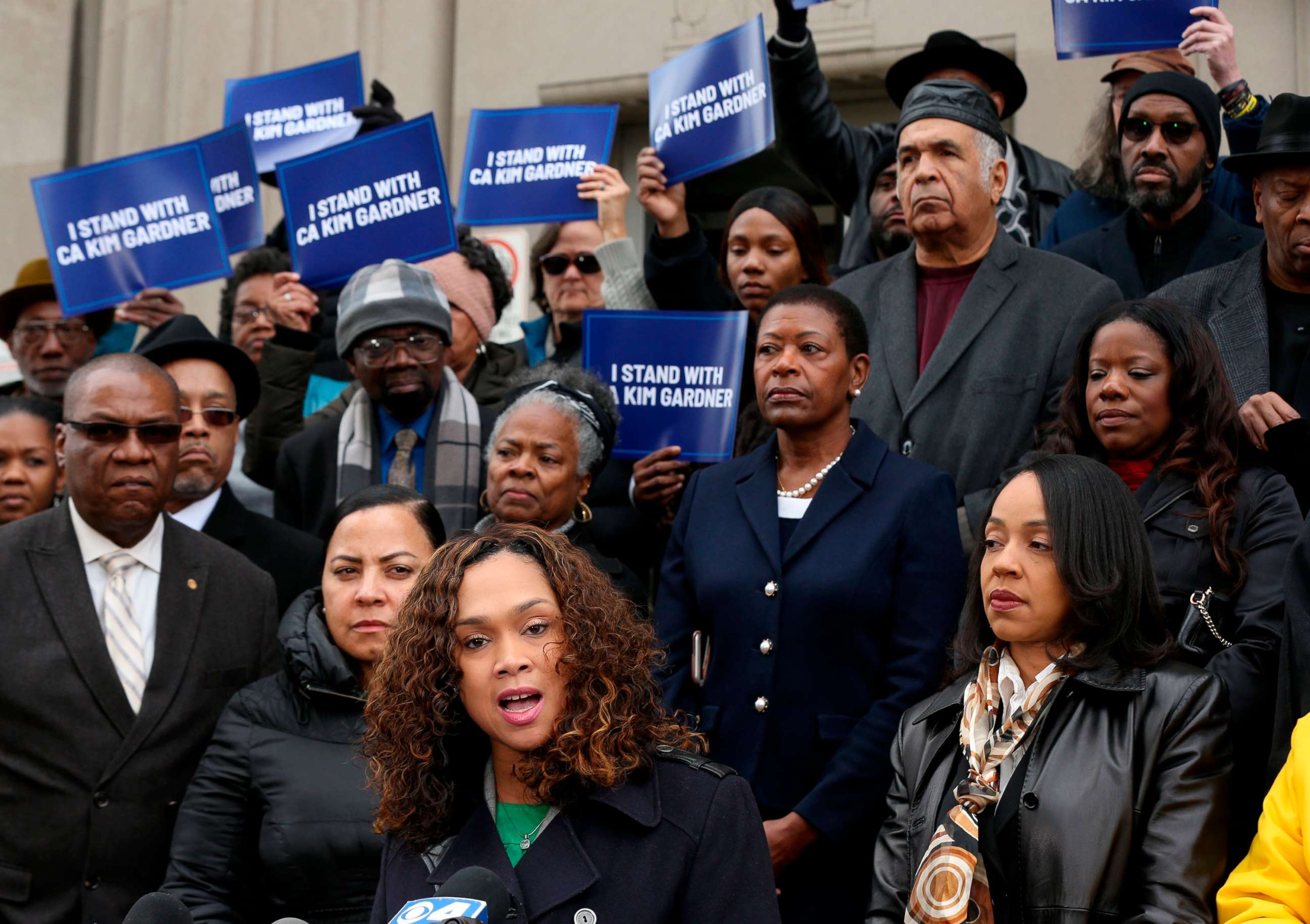
Prior to the press conference, 11 other prosecutors including Bronx County District Attorney Darcel Clark, not in attendance, signed a statement in support of Gardner.
"Although people aren't picketing in front of my house or sending death threats, it can easily be me one day," said Clark, a member of the "Sisters Circle" and the first black woman district attorney in New York State. "All it takes is one case for that to happen to me and if that does happen, I want them to be there for me like I am there for them."
Gardner, 44, is the first woman and black woman to lead the city's circuit court.
"I didn't know I was going to win...I never did a citywide race before," said Gardner, who received over 40% of the votes to win in 2016. "I was humbled and I am humbled."
Gardner hit the ground running after she was sworn in by teaming up with the Vera Institute of Justice's Reshaping Prosecution program that implemented reforms, policies and provide alternatives to incarceration.
"Justice is not just sending people to a jail cell, it's about how we don't do more harm to society and be ministers of justice," said Gardner.
So when Gardner received a complaint from a woman alleging that Missouri Governor Eric Greitens invaded her privacy by taking compromising photographs of her, felony invasion of privacy charges were filed against the governor in 2018.
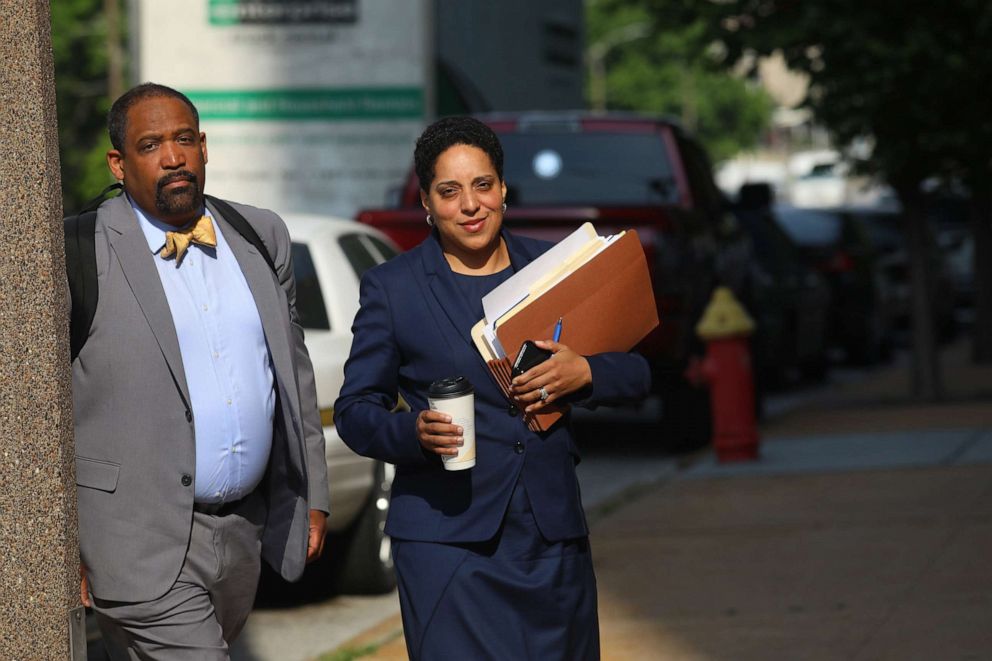
Gardner alleges that a public relations firm hired by the police union coordinated an effort to ruin her reputation if she did not dismiss the charges against Greitens. The case was also investigated by the state's House committee and found the woman, who was Greitens mistress from a 2015 affair, "credible," Gardner said.
"Some told me I would lose my license and I would lose my career if I didn't do what they said, but I still went forward," said Gardner who endured protests outside her office and photos of her face attached to caricatures.
Greitens ultimately reached an agreement with Gardner's office in which he would resign from office and stipulate that prosecutors had enough evidence to go forward to trial, according to a court document obtained by ABC News, although prosecutors also acknowledged that the trial outcome was not certain.
Weeks after Gardner held the Jan. 14 press conference with "Sisters Circle" members Mosby, Suffolk County District Attorney Rachel Rollins and Orange/Osceola State Attorney Aramis Ayala by her side, she says she received anonymous hate mail at her office and placed on her car.
Gardner read one of the letters to ABC News in which she was called a racial epithet and the writer hoped the Ku Klux Klan hangs her from a tree.
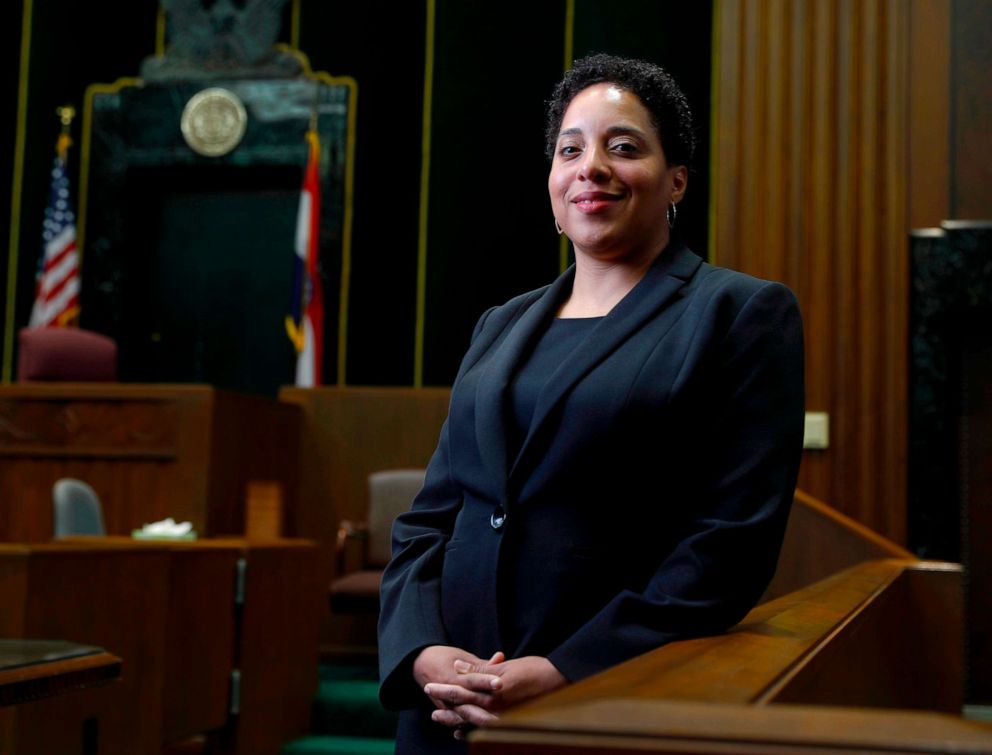
"When you are trying to change the system, I knew it was going to be difficult, what I didn't prepare for the was the racial divide that continues to say I can be controlled because I am a black female," said Gardner. "I knew I would get backlash, haters, the vitriol, people who been here in this office for 20 years said they never seen anything like this."
In response to the lawsuit, the police officer's union released a statement calling the discrimination allegations "frivolous, desperate and pathetic." In court documents, they denied all the allegation.
When Mosby returned back to Baltimore she received a racist and profanity-laced voicemail which she posted online with the caption, in part, "This is why #IStandWithKimGardner..."
Gardner said it's disturbing to still have to deal with racism in 2020. "It's troubling," she said but says she "fears no one."
Racist and sexist backlash
Gloria Blackwell, senior vice president of fellowship and programs at the non-profit advocacy organization American Association of University Women (AAUW), which the mission is to advance gender equity for women and girls through research, education, and advocacy, said it’s no surprise that black women in leadership are faced with racist and sexist attacks.
"It's not an accident that we are talking about this still in 2020...It is rooted in racism and in a system that was created long before we got here," said Blackwell. "Black women are educated and we did everything we have been told to do to move in the professional world. Even when we get to those positions, we always find that we have to consistently prove ourselves...but we are stuck by people who control the narrative. It's a double bind in the workplace, someone once called it 'double jeopardy.'"
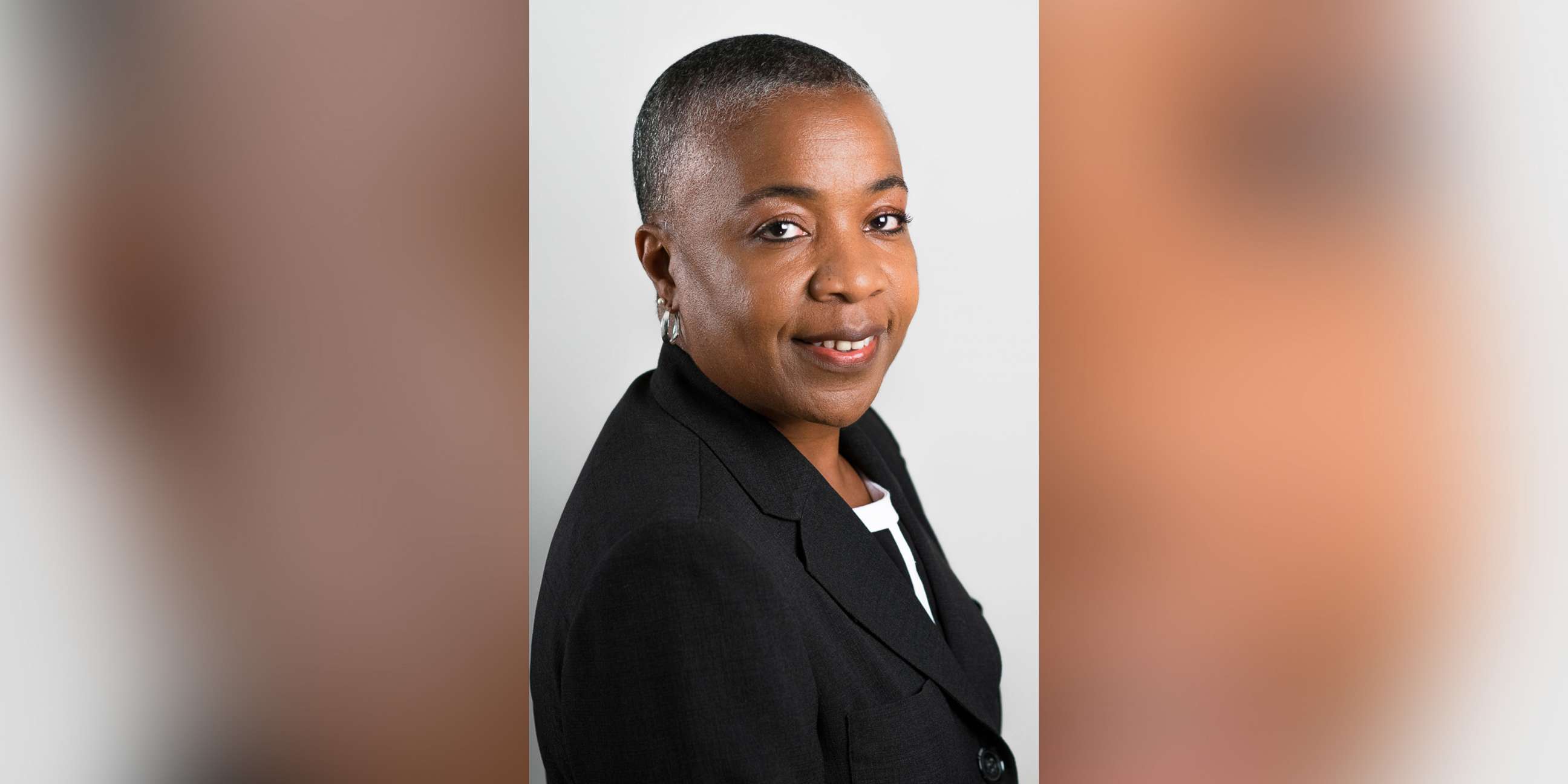
And Lisa Flores, a counseling psychology professor at the University of Missouri, said that the higher up women of color go, the more isolated they become.
"Moving up the ranks usually means being alone or being the one of the only because there aren't a lot of other women of color at higher levels to turn to for advice or to ask if something wrong is happening," said Flores.
When Cook County State Attorney Kim Foxx decided to run for office, she says she was not attracted to the idea of becoming a politician, but rather improving the community she came from. Foxx grew up on the North side of Chicago in the Cabrini-Green housing projects, is the survivor of sexual assault and earned her undergraduate and law degrees from Southern Illinois University and its School of Law.
Foxx, 47, says she became an attorney to advocate for children in foster care in the county's public guardian's office.
The longer Foxx was engulfed in the legal system, the more she says she saw and wanted to be among those who can make power moves to truly fix the system. In 2016, Foxx was elected as the first black female state attorney of the second largest prosecutor's office in the country.
"So when women of color are in a position to try to break down the narrative, barriers, and bring in policies to help everyone, they are looking at it as she's black and will only help black people," said Blackwell. "And because of that they have to tear that person down, question her qualifications, find ways to make others question why this person was elected in the first place."
In her first term, Foxx declined to prosecute over 5,000 low-level shop lifting and drug offenses and prosecuted fewer felony offenses that would have been pursued by the previous administration, according to an Oct. 2019 investigation by the Marshall Project. Many offenders were diverted to alternative treatment programs.
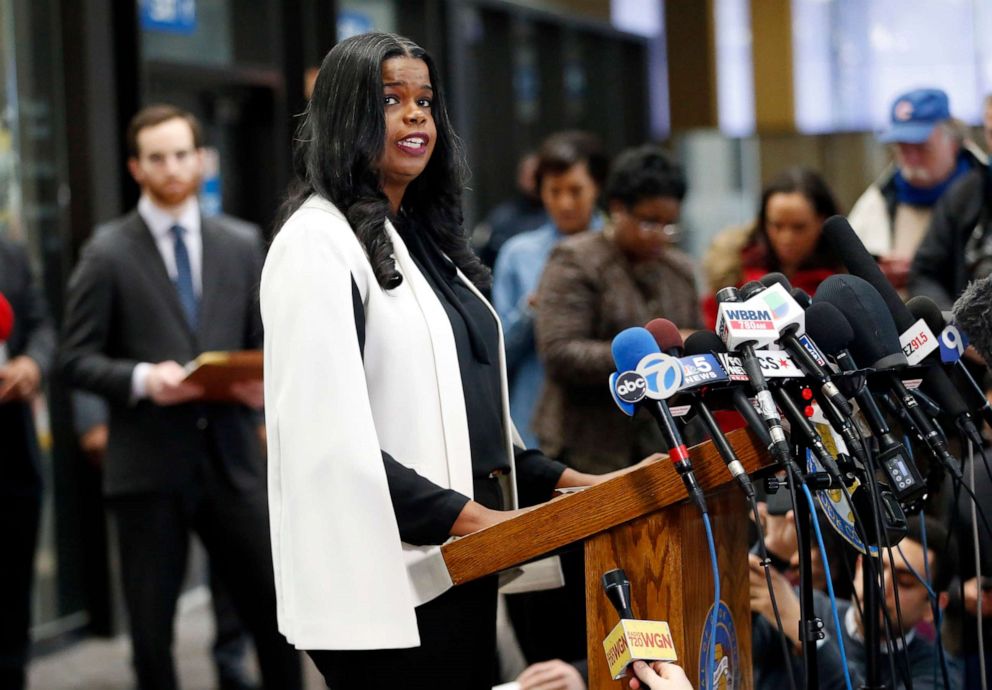
Foxx's policy changes and prosecution decisions became the topic of discussion for an anonymous pro-police blog where posters expressed offensive opinions about her. Throughout the blog, Foxx's last name is sexualized with an extra "x" at the end and she's often referred to as "Crimesha.”
"Women of color are often the target of sexist and racist stereotypes -- it is a form of double jeopardy because they are members of multi-oppressed groups," said Flores. "The experience of white women and women of color are the same, but different because of the racism behind it."
"They would post that I'm a criminal, a thug...the name Crimesha is soaked in racism and misogyny, they even posted my address," said Foxx, before taking a pause to discuss the most high-profile case that pushed her into the national spotlight.
During the early morning of Jan. 29, 2019, Jussie Smollett, then an actor on the show "Empire," reported that he was allegedly the victim of a racist, anti-gay attack by two men. It was later alleged by the Chicago Police Department that Smollett was untruthful about the attack.
Foxx agreed to drop charges against Smollett in exchange for community service and forfeiting his $10,000 bond, a move that sparked outrage and criticism from across the country.
Smollett was indicted in February for making false reports to police that he was a victim of a hate crime after a special prosecutor investigated the state's investigation into his case. He denies the charges and stands by his story.
"We received so much hate mail and threats," said Foxx, adding that, a majority of the messages called her racial slurs and derogatory terms for a woman.
Foxx was most disturbed when a protest in front of her office in April 2019 was, according The Chicago Sun Times as well as witnesses and photographs from the rally, believed to be three white nationalists groups.
"It was scary...what did we do for white nationalists to get involved?" asked Foxx.
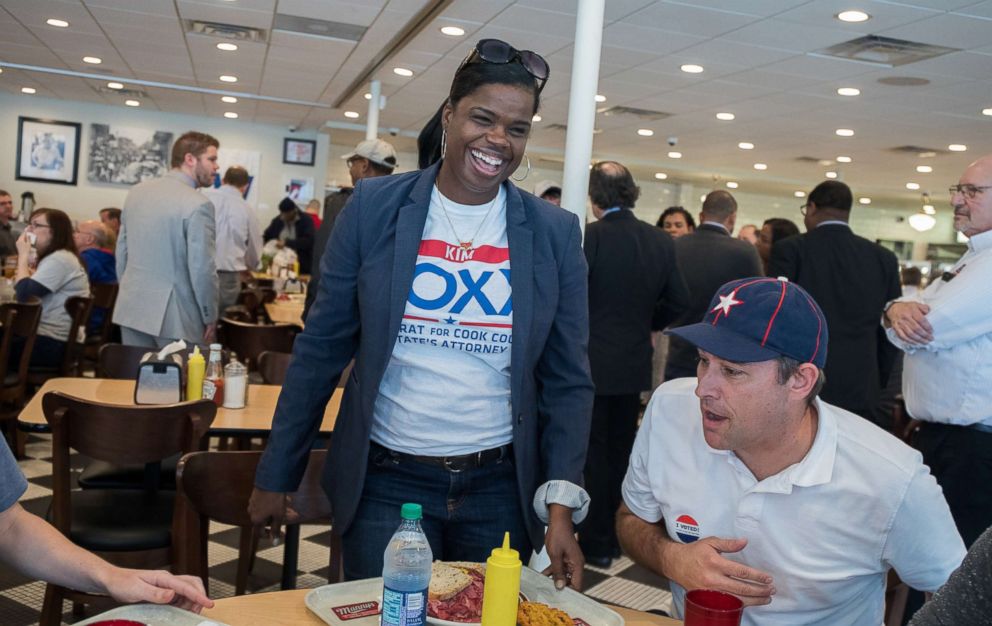
"I'm here to do a job...with the misogyny and the racism, you have to develop a thick skin and you wash it off, you have to brush it off as a part of the job," said Foxx, who is up for re-election this year.
Foxx, a member of the "Sisters Circle," says she is relieved that she is able to lean on other women in her position.
"The sisters in this circle are everything," said Foxx, who met Mosby while campaigning.
Here are some of the other women in this elite group and their experiences:
Aramis Ayala, Orange-Osceola (Florida) state attorney
When Ayala was elected into office, she was the first black woman to earn that spot. Ayala did not imagine that halfway through her first term she would announce that she will not seek re-election.
Prior to Ayala getting sworn in, she says her passion was to become a sex crime prosecutor and pursing the prevention of domestic violence related homicides.
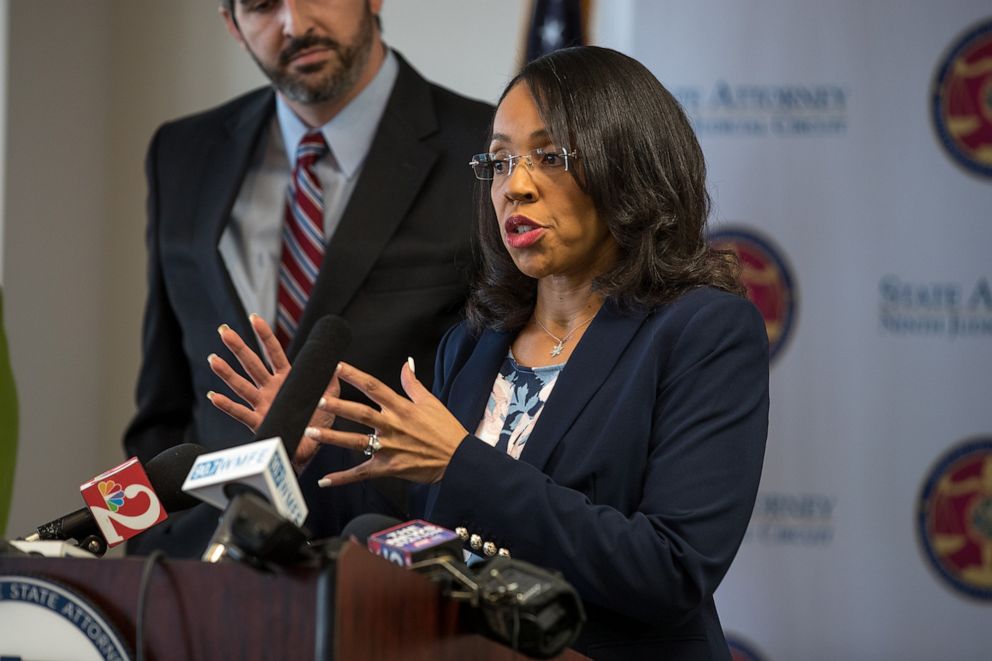
In 2016, the state's supreme court declared the death penalty unconstitutional and in Ayala's first days in office, she was greeted with 27 death penalty cases to re-evaluate.
"I was now asking 'why are we trying to legitimatize these cases?'" said Ayala, 45, who says she researched the issue and realized executions are "not a deterrent, it's all about vengeance."
When she announced she wouldn’t pursue death penalty sentencings with first-degree murder cases, the governor revoked her office's right to prosecute those cases and gave them to a neighboring prosecutor's office.
When she sued the former Governor Rick Scott to get her power back to prosecute first-degree murder cases, $1.3 million was cut from her budget and she said she received death threats and a noose in the mail.
"This type of experience was more than just disagreement it was racially charged," said Ayala.
One of the online attackers was B. Stanley McCullars, a supervisor with the Seminole County Clerk of Courts, who ultimately was forced to resign from his job.
McCullars wrote on Facebook in 2017 that Ayala should be hung from a tree and receive the death penalty after she did not seek capital punishment for Markeith Loyd, who was accused of killing his pregnant girlfriend and a state trooper.
McCullars apologized, deleted the post and then went on to file a federal civil rights lawsuit against the city and his former employer for violating his First Amendment rights.
"I had to testify in court that it was wrong to let someone have the right to say they have right to say that I should be killed. The federal judge threw it out," Ayala told ABC News.
McCullars has not filed an appeal, online records show.
Regarding the Loyd case -- one of three first-degree murder cases the governor revoked -- the state's supreme court ruled against Ayala.
"I knew I had a conflict I had to grapple with and I refuse to grapple when pursing justice," said Ayala who announced last May that she wouldn’t seek reelection and be the signature to the "wheels of death."
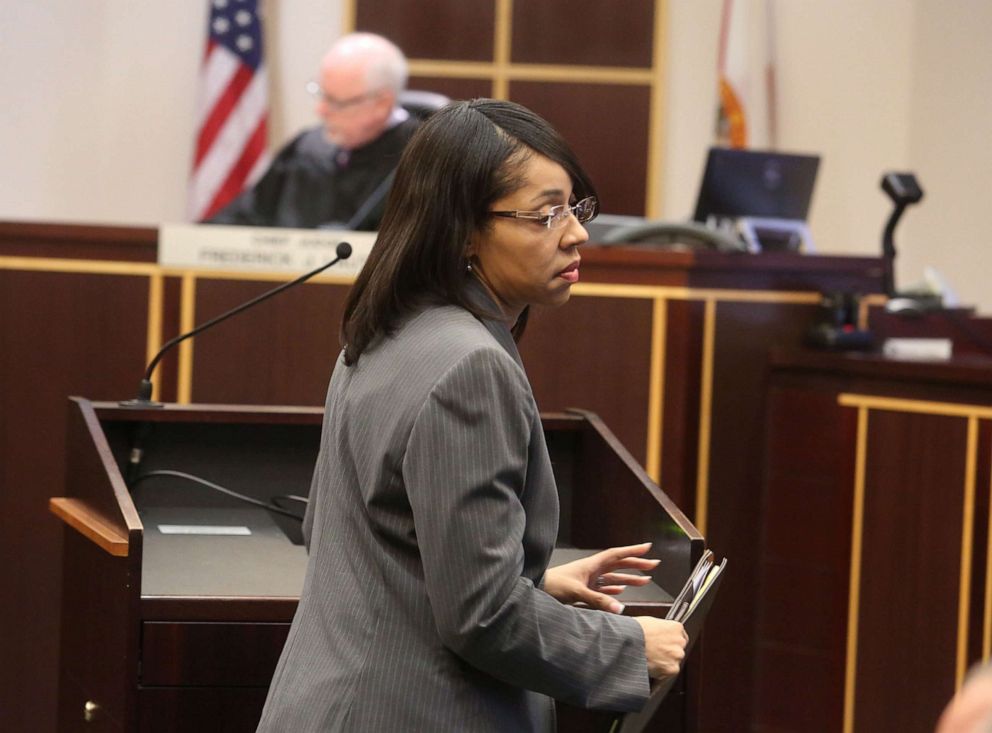
Despite the higher court's ruling, Loyd did not receive a death sentence, but life without the possibility of parole.
Five months after Ayala filed the lawsuit against Scott, she decided to withdraw the claim and created a recommendation panel of seven assistant state attorneys which would decide if the death penalty should be sought for first-degree murder cases, the Orlando Sentinel reported.
"There still hasn't been a death sentence in my circuit and several cases were converted to life sentences since they took away those cases from my office," said Ayala.
Although Ayala is removing herself from the state attorney spotlight, she is not leaving the legal field. Instead she will focus on continuing to legally better the community with conversion programs and supporting crime victims.
Jackie Lacey, LA County district attorney
Los Angeles District Attorney Jackie Lacey, 63, is the first black woman to oversee the largest prosecutor's office in the country with almost 1,000 attorneys on staff.
"From day one, when you first get this job, you have to know you have a target on your head," said Lacey. "You're making tough and hard decisions...There is never love for the district attorney."
She is up for re-election for her third term this year and is not immune to criticism. In fact, she says her biggest critics are activists with the Los Angeles chapter of Black Lives Matter (BLM) for a number of reasons including what they say are the low number of police officers charged for allegedly killing people of color.
Since January 2012, the Los Angeles County District Attorney’s Office has filed one case involving an on-duty shooting by a Los Angeles County sheriff’s deputy and three cases where off-duty officers were charged with murder, a spokesman with the prosecutor's office confirmed to ABC News.
The office's Justice System Integrity Division has released reports since 2016 of their investigations into police involved fatal and non-fatal shootings. In January and February, the office investigated 21 police involved fatal and non-fatal shootings and did not file any charges. There were also 11 in November and December 2019 that also resulted with no charges getting filed.
Lacey said during her two terms she has made efforts to bridge the gap with the community.
"I'm the first African American woman to hold this job and the first to open the door to talk to the community," she told ABC News during an interview in February.
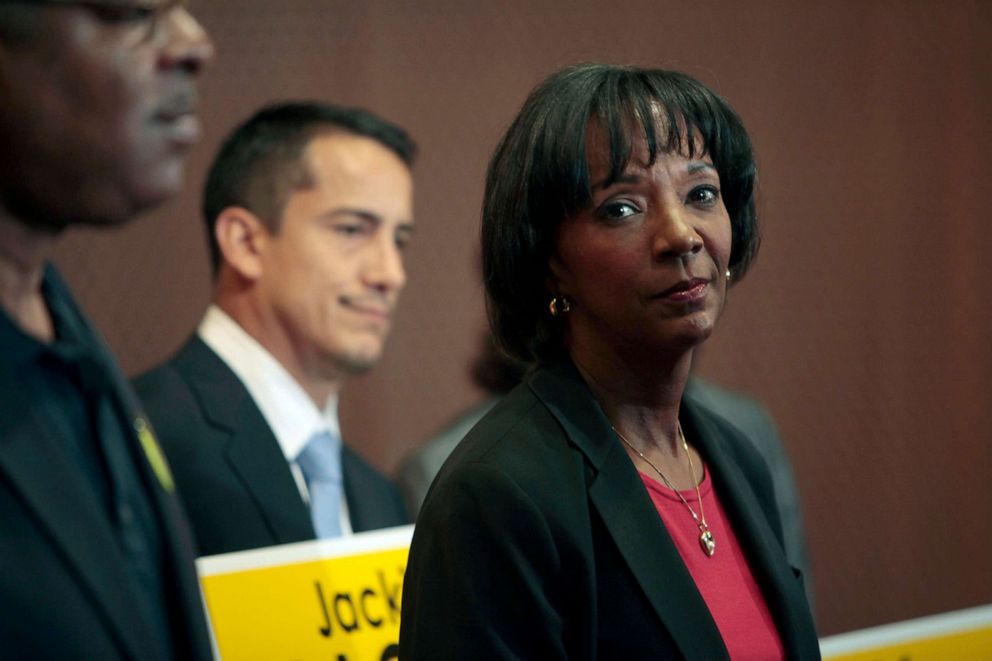
At a 2018 town hall meeting, it turned into the audience calling her "the devil, guys in the front going gang signs and a woman having a child shouting 'you have to go!' it was out of control," said Lacey who left the building.
Following that hectic event, Lacey tried to have a smaller gathering with community leaders, but she said to no avail.
Since then, the activists have scheduled protests at Lacey's office and house for months demanding that she meet with them.
On the eve of primary elections on March 3, BLM activists showed up at Lacey's Granada Hills home early in the morning and rang the bell, according to police. The pre-dawn door knockers were met with Lacey's husband pointing a gun at the uninvited guests, demanding them to leave the porch.
The incident was captured on video and was posted on social media.
Lacey apologized for the incident at a press conference the following day and went on to win almost 50% of the votes.
The chapter's co-founder Melina Abdullah said the protesters were "traumatized" and did not accept Lacey's apology. “She didn’t apologize to us,” Abdullah said to the Associated Press. “And an apology isn’t enough. We need her to change. We need her to be accountable or she can retire."
Lacey, who has served as a prosecutor since 1985, said she doesn't allow "political pressure" to influence her to make decisions and has attempted to explain her position to the activists to no avail.
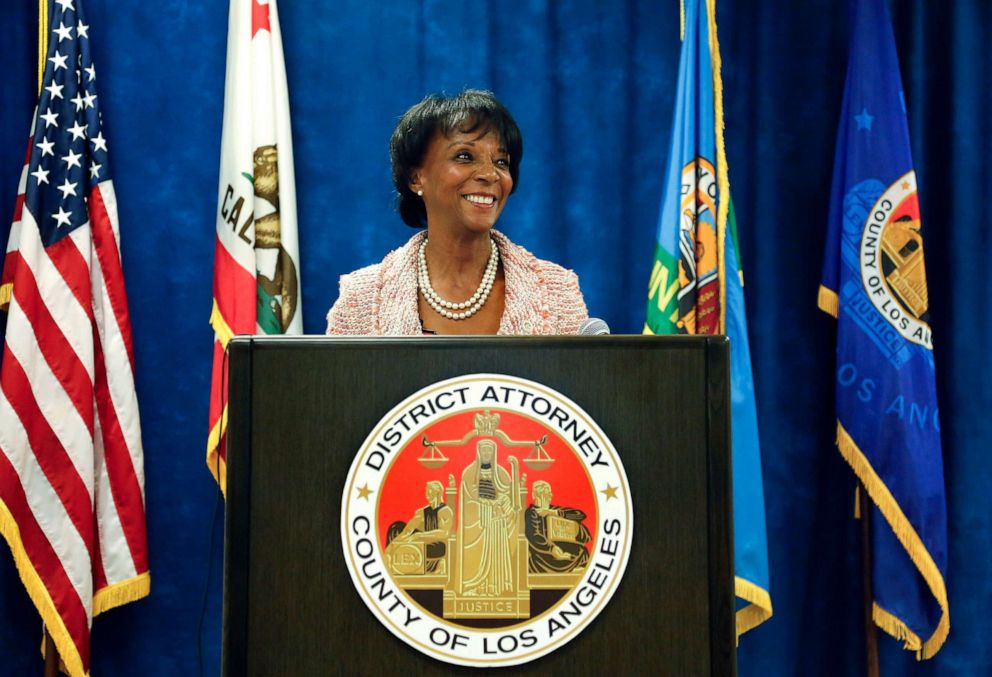
While she is not a part of the "Sisters Circle," it saddens her to hear what the other 1% are dealing with for doing their "calling."
"I would have hoped by 2020 -- I grew up in the 60s -- a lot of this racism would have disappeared and these words would have disappeared...it's terrible how our people are treated," said Lacey. "This is not a job for me it is a calling. When you are willing to put your life at risk, it's a calling. These are the jobs we signed up for."
Darcel Clark, Bronx (New York) district attorney
In New York, another veteran prosecutor, Clark took an unconventional route to her current position.
Clark started her career in 1986 when she served as a prosecutor for 13 years, a state judge for 16 and as an appellate court judge for three before her predecessor Robert Johnson -- the first black district attorney in the state -- stepped down to become a civil court judge and the Democratic Party put her as a candidate. She ran in the general election and won.
"I got connected to the other women of color who are also first and we found that for some of us it was hard to effectuate reform in the jurisdictions they are in," said Clark.
Clark, 57, admits that it was difficult for her to change the culture of the office that once had to deal with 478 murders in the borough in 1989. New York City had a little over 300 homicides in 2019.
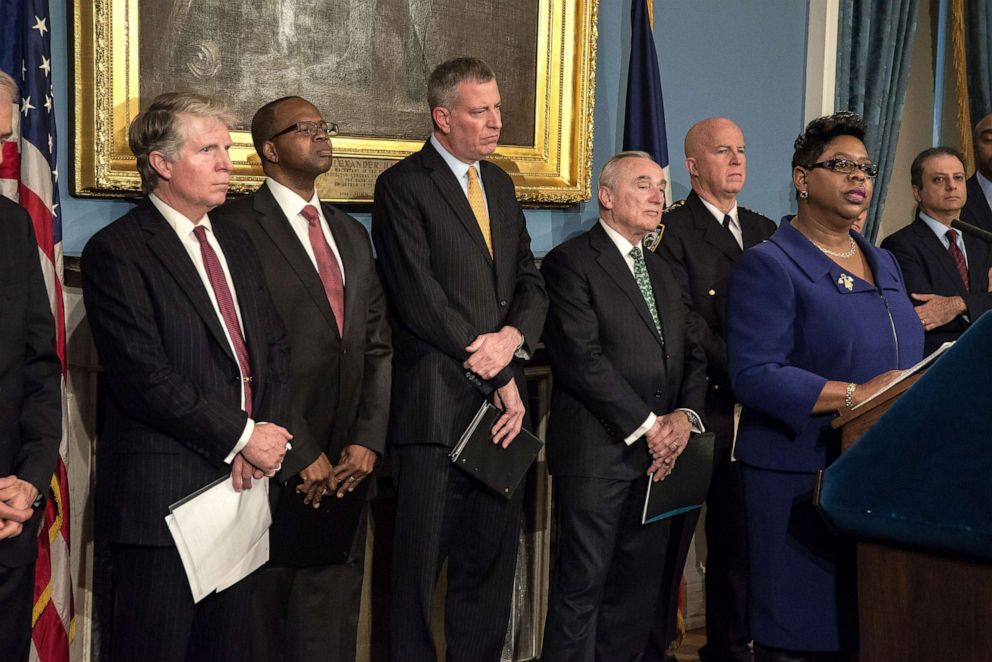
"Back then it was nail 'em and jail 'em. I have to own what was my part of mass incarcerations, that's not the way to do it now," said Clark, who has revamped the office's re-entry program and tweaked the bail policy before it was reformed in January to include giving defendants options to post bail. "While presiding, I saw injustices to the defendant with burdened defense attorneys who didn't care about another person of color going to Rikers Island, the clients suffered."
"If there's no jail then no bail," said Clark, meaning that if the offense will not result with a jail or prison sentence, do not set bail.
Clark said she is not immune to social media attacks that she ignores or criticisms she says she receives from by Ed Mullins, the leader of the NYPD's Sergeants Benevolent Association.
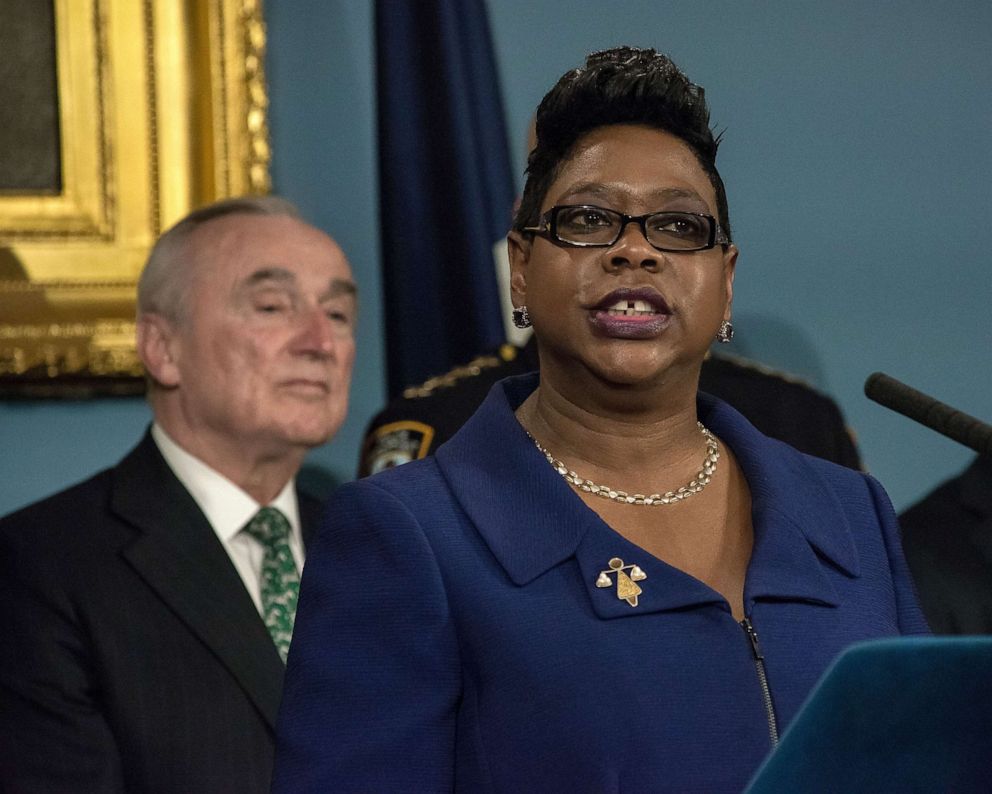
"He has hated me ever since I indicted Deborah Danner's killer, he has called me the worst DA ever, he still says that about me," said Clark. NYPD Sgt. Hugh Barry, shot and killed Danner, a mentally-ill 66-year-old bat-wielding woman.
Barry claimed self-defense and was acquitted after trial in February 2018 despite a fellow officer testifying at the criminal trial that Danner did not swing the bat. The city agreed to pay a $2 million wrongful death settlement to Danner's family in December 2018, in part, because of the indictment and pending disciplinary actions against Barry.
Barry remains on modified duty, an NYPD spokeswoman confirmed to ABC News. Mullins did not respond for request for comment.
Police officers protested in front of her office because of the indictment.
"I don't suffer like Gardner, Mosby and Foxx...their resistance are strong, but at any time that could be me, the NYPD could be mad at me tomorrow," said Clark. "There's people who go through extremes to try and prove a point and that's why I support my sisters."



